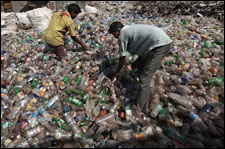 The Municipal Corporation of Greater Mumbai has invited global EOI for setting up a municipal solid waste processing and disposal facility to process MSW through viable and sustainable technologies.
The Municipal Corporation of Greater Mumbai has invited global EOI for setting up a municipal solid waste processing and disposal facility to process MSW through viable and sustainable technologies.
The municipal corporation is responsible for collection, segregation, storage, transportation, processing and disposal of solid waste in its area encompassing about 437 sq. km and a population about 12.5 million and a floating population of about 5 million.
Mumbai generates an average of 7,000 tonnes per day of solid waste of which about 5,000 tonnes is general municipal waste, about 2,000 tonnes is silt and construction debris, and 10 tonnes is biomedical waste. The total solid waste generation in Great Mumbai is expected to reach 10,000 tpd by 2025 and the three existing landfill sites are nearing the end of their operational life.
|
|||||||||||||||||||||||||||||||||||||
Most of the municipal solid waste is collected and disposed off at landfill sites at Deonar, Mulund and Gorai. At 131 hectares, the Deonar dumping ground is the largest, receiving about 4,800 tpd of garbage followed by Gorai (2,200 tpd) and Mulund (700 tpd). The total area available for landfill/dumping at all the three sites is 151 hectares which is inadequate. Only 100 to 150 tpd is treated for localised vermin composting, biogas generation etc.
Municipal solid waste comprises compostable matter, paper and cardboard from residential and commercial premises, sand and fine earth from the street, and other materials like plastics, metals and glass.
The scope of the turnkey project broadly involves processing of municipal solid waste by adopting suitable technology or combination of technologies with minimum process residues so as to minimise burden on landfill and disposal of residues of waste processing facilities as well as pre-processing rejects from the waste processing facilities in a landfill as specified in MSW Rules.











